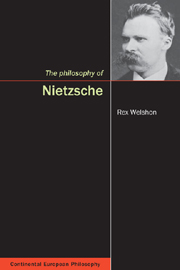2 - Religion
Summary
Nietzsche is the most notorious philosopher because he is alleged to be an anti-Semite, a proto-Fascist and an anti-Christian. He is neither anti-Semite nor proto-Fascist, but he is anti-Christian. Nietzsche announces that God is dead in The Gay Science and spells out the reasons in his searing attack on Christianity in The Anti-Christ. This book in particular has made Nietzsche a target of vilification by most Christians and political conservatives. Unlike the other two sources of infamy, however, Nietzsche's notoriety on this score is accurately attributed and entirely deserved. He despises most religions and Christianity in particular. Consider:
In Christianity neither morality nor religion come into contact with reality at any point. Nothing but imaginary causes (“God”, “soul”, “ego”, “spirit”, “free will”, – or “unfree will”); nothing but imaginary effects (“sin”, “redemption”, “grace”, “punishment”, “forgiveness of sins”). A traffic between imaginary beings (“God”, “spirits”, “souls”); an imaginary natural science (anthropocentric; complete lack of the concept of natural causes); an imaginary psychology (nothing but self- misunderstandings, interpretations of pleasant or unpleasant general feelings, for example the condition of the nervus sympatheticus, with the aid of the sign-language of religio-moral idiosyncrasy – “repentance”, “sting of conscience”, “temptation by the Devil”, “the proximity of God”); an imaginary teleology (“the kingdom of God”, “the Last Judgment”, “eternal life”).
(AC 15)Christianity is a fraud on every level imaginable: psychological, teleo-logical, ethical, cosmological and scientific. It is, from start to finish, nothing but lies motivated by the vile aspiration to destroy what is best in humanity.
- Type
- Chapter
- Information
- The Philosophy of Nietzsche , pp. 37 - 56Publisher: Acumen PublishingPrint publication year: 2004

